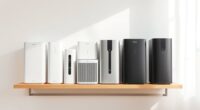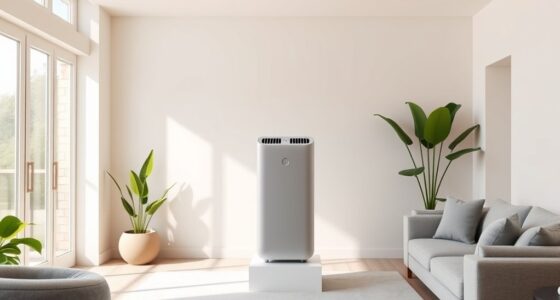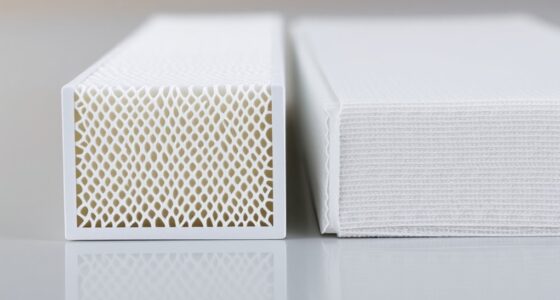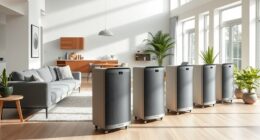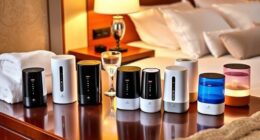If you want the most reliable and effective air purification, HEPA filters are usually the better choice. They trap at least 99.97% of tiny particles like dust, pollen, and smoke, making them ideal for allergy or asthma concerns. Ionizers are quieter and require less maintenance but may not remove all small particles as efficiently. To discover which option suits your needs best, you’ll find more details below.
Key Takeaways
- HEPA filters provide more reliable removal of tiny airborne particles, including allergens and pollutants, compared to ionizers.
- Ionizers are quieter and require less maintenance but generally offer less comprehensive air purification.
- HEPA filters are proven to trap at least 99.97% of particles as small as 0.3 microns, making them more effective overall.
- Ionizers produce negative ions to clump particles but may leave some pollutants unfiltered and can generate minor ozone byproducts.
- For consistent, high-efficiency air cleaning, HEPA technology is typically the better choice over ionizers.
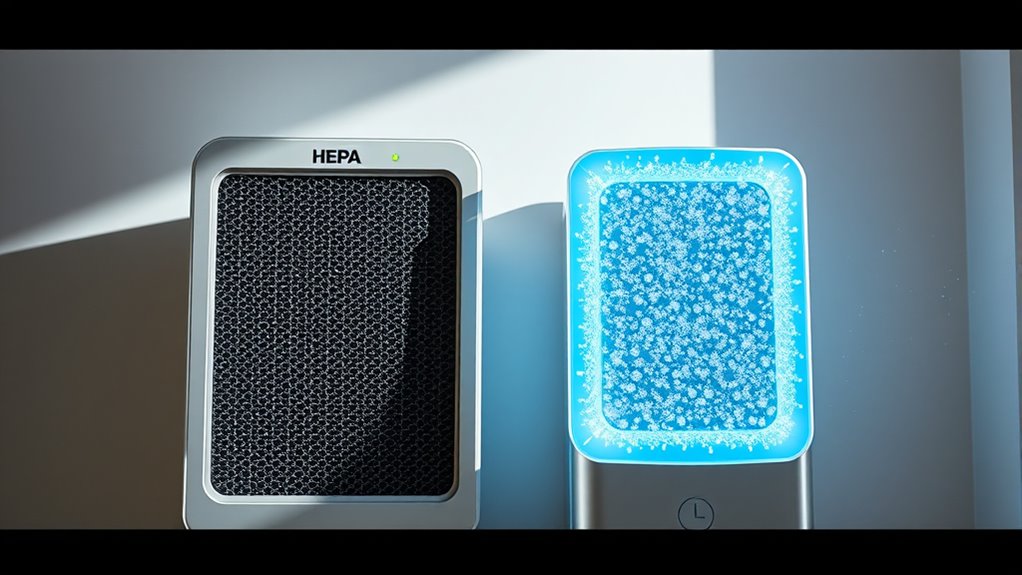
When choosing an air purifier, understanding the differences between HEPA and ionizer technology is essential. Both aim to improve your indoor air quality, but they do so through different mechanisms, impacting air purification efficiency and noise levels. HEPA filters are designed to trap tiny particles like dust, pollen, pet dander, and smoke, capturing at least 99.97% of particles as small as 0.3 microns. This makes them highly effective at removing airborne pollutants, especially if you suffer from allergies or asthma. The air purification efficiency of HEPA filters is well-proven, providing consistent and reliable filtration without producing harmful byproducts. In contrast, ionizers work by releasing negatively charged ions into the air. These ions attach to airborne particles, causing them to clump together and settle on surfaces or be collected on charged plates within the device. While ionizers can reduce airborne particles, their efficiency varies depending on room size, particle load, and device quality. Some particles, especially smaller ones, may not be affected as thoroughly as with a HEPA filter, which could mean less overall air purification efficiency in certain environments.
Noise level comparison is another critical factor. HEPA purifiers tend to operate quietly in most settings, especially models designed for bedroom use. Their fans run at different speeds, but even at higher settings, they usually produce minimal noise, making them suitable for daytime work or sleep. Ionizer air purifiers are often quieter because they lack large filters and rely on electrical charges to clean the air. However, some models may produce a slight buzzing or hissing sound due to their ionization process, which can be noticeable in quiet environments. Additionally, the noise levels of ionizers are generally consistent, as they don’t rely on mechanical filters that require frequent replacement or cleaning.
Ultimately, your choice hinges on your specific needs. If you prioritize air purification efficiency, especially for allergens or fine particles, a HEPA filter is typically the best option. It offers proven performance and fewer concerns about byproduct emissions. If you’re looking for a quieter, maintenance-light device that can still improve air quality, an ionizer might suit you, but keep in mind it may not be as effective at removing all pollutants. Balancing air purification efficiency with noise levels will help you select the right technology for your environment, ensuring cleaner air without disrupting your daily life.
Frequently Asked Questions
Which Air Purifier Type Is More Energy-Efficient?
You want to know which air purifier is more energy-efficient. Generally, HEPA filters consume less power because they rely on fans to circulate air, making them more power-efficient for long-term use. Ionizers tend to use more energy due to their ion-generating components. When comparing devices, check their energy consumption ratings to find one that offers better power efficiency, helping you save on energy costs while maintaining clean air.
Are HEPA or Ionizer Purifiers Better for Allergy Sufferers?
If you’re an allergy sufferer, HEPA filters are typically better because they trap airborne allergens like pollen and pet dander effectively. Ionizer efficiency can vary; some release charged particles that attract allergens, but others may produce ozone, which can worsen allergies. So, for cleaner air and relief, choose an air purifier with reliable HEPA filters, and be cautious with ionizers to avoid potential ozone issues.
Do Ionizers Produce Harmful Ozone?
You might wonder if ionizers produce harmful ozone. While some models emit small amounts, many prioritize ozone safety and keep levels within health risk limits. It’s important to check the product specifications for ozone emission ratings. If you’re concerned about health risks, choose ionizers with low or zero ozone output. This way, you enjoy cleaner air without exposing yourself to potential ozone-related health hazards.
How Often Should Filters Be Replaced in Each Purifier?
You should check your air purifier’s filter lifespan for peak performance. Typically, HEPA filters need replacement every 6 to 12 months, depending on usage and air quality, while ionizer filters may last longer or require less frequent replacements. Regularly replacing filters ensures your device maintains its efficiency and air quality. Always follow the manufacturer’s guidelines for replacement frequency to keep your purifier working effectively and extend its lifespan.
Can Both Technologies Be Used Together Effectively?
While it might seem like a harmonious dance, combining air purification technologies like HEPA filters and ionizers can enhance overall air quality. You can effectively integrate these systems to complement each other’s strengths, capturing particles and neutralizing odors. However, guarantee proper technology integration and maintenance to prevent potential issues like ozone production. When used together thoughtfully, they can create a cleaner, healthier environment, offering you the benefits of extensive air purification.
Conclusion
Ultimately, choosing between HEPA and ionizer technology depends on your preferences and needs. Both offer unique ways to improve your air quality, each with its subtle strengths. Remember, no solution is perfect, but with patience and understanding, you can find the right fit for your space. Trust your instincts and recognize that sometimes, the best air purifier is the one that gently meets your environment’s quiet needs, whispering peace into your daily life.

